Discovery Institute's Blog, page 65
May 27, 2016
The Economist Admits "Human Intelligence Is a Biological Mystery"
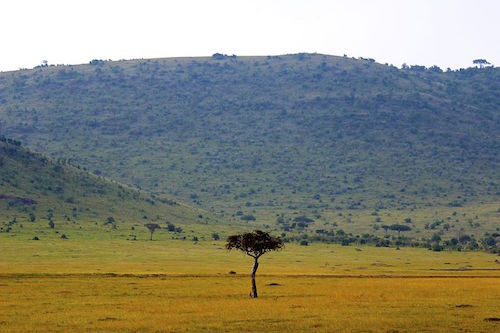
I am not so much interested in why and how human beings became exceptional, just in defending the fact that we are. But others keep trying. Darwinists are apparently having fits figuring it all out.
Human intelligence is a biological mystery. Evolution is usually a stingy process, giving animals just what they need to thrive in their niche and no more. But humans stand out. Not only are they much cleverer than their closest living relatives, the chimpanzees, they ar...
Toward a Consensus: An Open Letter to BioLogos on the Genetic Evidence

Dennis Venema, professor of biology at Trinity Western University and Fellow at BioLogos, has written a series of articles that have been noted by evolutionists for their clarity and persuasiveness. So as a collector of evidences and reasons why evolution is a fact, I was interested to see Venema's articles. What does the professor have to say to help confirm what Samuel Wilberforce rhetorically called "a somewhat startling conclusion"?
Finagling Molecular Clocks to Fit Darwinism
Finagle's Constant is whimsically defined as "that quantity which, when added to, subtracted from, multiplied by, or divided by the answer you got, gives you the answer you should have gotten." One of the best examples in modern science is the so-called "Molecular Clock" hypothesis in evolutionary theory.
In Current Biology, Michael S. Y. Lee and Simon Y. W. Ho teach the uninitiated about the wizardry that goes into molecular clocks. First, a bit of history.
In the 1960s, several groups of s...
May 26, 2016
The Medical Background to Intelligent Design

We've commented before that physicians (like engineers) have a special perspective on intelligent design. Why? Because they, more than evolutionary biologists, are acutely attuned to questions of function. Biological systems not only need to exist but to function properly. It's no use tracing a hypothetical path of evolutionary descent unless every living thing along that path was fully functional in the real world.
On a new ID the Future podcast, biologist Michael Denton talks about the int...
Could This Be the Oldest Evidence Yet for Multicellular Eukaryotes?
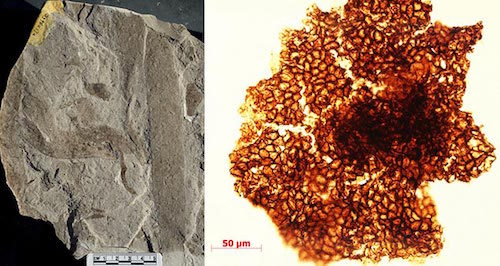
Writing in the journal Nature Communications, Zhu et al. describe new fossil evidence from 1.56-billion-year-old mudstones in North China. The authors interpret these fossils as the oldest record of multicellular eukaryotes so far. But their enthusiasm looks premature.
Interviewed by The Guardian, the first author, Maoyan Zhu, raves: "This totally renews current knowledge on the early history of life." The newspaper's headline echoes the sentiment, reporting: "Complex life on Earth began bi...
Design through the Looking Glass
You don't have to hold an amino acid up to a mirror to see its mirror image. Amino acids (except for one, glycine) come in pairs, like gloves, on the real-world side of the looking glass. So do the sugars used in DNA and RNA; they are assigned a "handedness" based on conventional rules of describing their orientation in 3-D space. In all other physical respects, chemical and thermodynamic, they are identical in their activity. This makes them difficult to separate.
The phenomenon is known as...
May 25, 2016
Humans, Chickens, and the Vitellogenin Pseudogene -- Summing Up
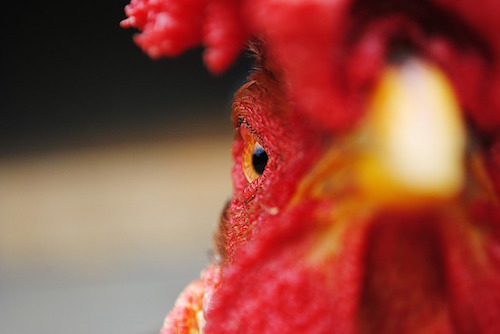
Let's take a moment to summarize the results of our comments on the vitellogenin pseudogene and its meaning for the question of universal common ancestry. According to the data, the debate concerns six total genes supposedly shared by humans and chickens.
Having offered our observations here:
"Functional Pseuodogenes and Common Descent"
"The Vitellogenin Pseudogene Story: Unequally Yolked"
...we'd say the situations stands as follows.
Three of those genes (ELTD1, SSX2IP, CTBS) are functional...
Doug Axe's Undeniable Not Yet Out, Tops Amazon's Organic Evolution List; See the Trailer Now
Not bad. Here's Doug Axe's new book, Undeniable: How Biology Confirms Our Intuition That Life Is Designed, not out for another month and a half but it's already had the distinction of hitting #1 on Amazon's Organic Evolution list:
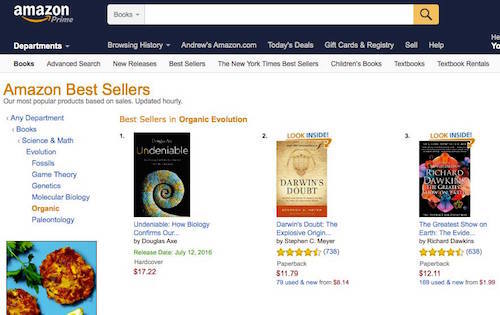
Note that Dr. Axe is right ahead of Steve Meyer's Darwin's Doubt, which in turn is right ahead of Richard Dawkins's The Greatest Show on Earth: The Evidence for Evolution. That's good company, and a satisfying threefold juxtaposition in itself.
Meanwhile, here's th...
May 24, 2016
Scientist Confirms We Are Not "Just Apes"
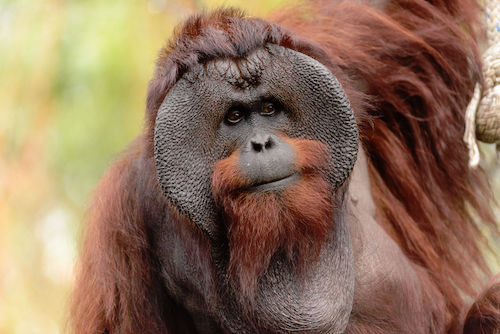
Defending human exceptionalism can be a lonely job these days. Many in the science community, participants in the increasingly radical environmental movement, animal rights ideologues, and even some of the most mainstream writers in the popular media have become emotionally committed to proving that humans are just another species in the forest.
That is why I was heartened to see an article at Real Clear Science, authored by Professor S. Joshua Swamidass (discussing a presentation at UC San...
Common Ancestry and Human Uniqueness
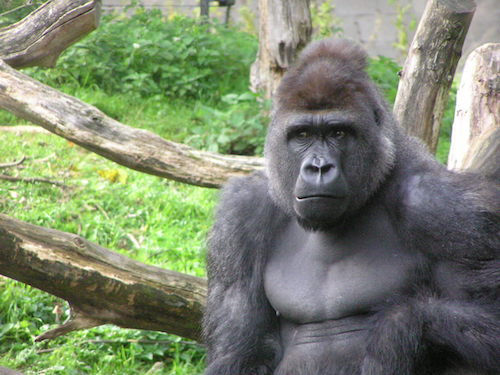
Washington University biologist S. Joshua Swamidass has posted an interesting essay about human uniqueness that is worth reading. Swamidass makes the point that just because one accepts common ancestry for humans and apes doesn't mean one has to embrace the claims of those who debunk human uniqueness. I agree with him.
A good example of someone who adopted this approach is Alfred Russel Wallace, who co-developed the theory of evolution by natural selection with Charles Darwin, and whom Swam...
Discovery Institute's Blog
- Discovery Institute's profile
- 15 followers





